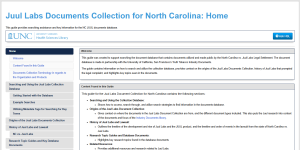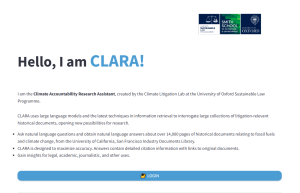
Collections
 @industrydocs on Twitter
@industrydocs on Twitter
OIDA staff added over 220,000 documents to the Teva and Allergan Documents. This batch brings the collection to more than 1.7 million documents and includes training materials, marketing communications, and more.
The Teva and Allergan collection will encompass about 1.9 million documents when complete. Processed documents are being made public on a rolling basis with monthly releases expected through 2025.
This month, IDL staff added over 200,000 documents produced by the Settling States in the multistate litigation against Juul Labs. When complete, the Juul Labs collection will contain approximately 7 million documents. IDL is working through the files as quickly as possible and will post new documents every month.
North Carolina Juul Labs Collection18,000 new files have been added to the Juul Labs Collection under the State of North Carolina sub-collection. These materials represent some of the final batches to be processed from the North Carolina settlement agreement.
Explore the new NC Juul Labs Research Guide!
UNC Libraries has created a comprehensive research guide to help you navigate the Juul Labs documents from the North Carolina settlement. This guide provides insight into the origins of the Juul Collection, covering the history of Juul Labs, the NC litigation, and key themes found in the documents. Whether you're researching industry practices, public health impacts, or legal actions, this resource is full of information to get you started.
A team at the Climate Litigation Lab at the University of Oxford Sustainable Law Programme has built a free AI research assistant using our fossil fuel industry documents! The Climate Accountability Research Assistant (CLARA) uses large language models and the latest techniques in information retrieval to interrogate large collections of litigation-relevant historical documents, opening new possibilities for research.
Read more about it in this LinkedIn post.
Please follow us @ucsf-industrydocs.bsky.social for updates about new documents and events. We also continue to post to LinkedIn, Mastodon, and Twitter/X to stay connected with our research community wherever they are.
We’re busy updating our IDL website, which will launch later this year with a more modern design, faster performance, and better compatibility with mobile devices. As part of this work, we’re collecting feedback from people who use our website.
If you’re interested in taking part in this user research, please email us at industrydocuments@ucsf.edu. Your feedback will be invaluable in helping us make our website easy to navigate for all our users.
Opioid Industry Documents Archive
Teva and Allergan Documents
OIDA staff added 226,880 documents to its newest collection, the Teva and Allergan Documents. This batch brings the collection to more than 1.3 million documents and includes sales training presentations, marketing communications, and more.
The Teva and Allergan collection will encompass about 1.9 million documents when complete. Processed documents are being made public on a rolling basis with monthly releases expected through 2025.
Truth Tobacco Industry Documents
JUUL Labs Collection
2,800+ new documents were posted to the Juul Labs Collection today!
In partnership with the University of North Carolina at Chapel Hill Libraries, the IDL has processed and made available documents subject to public disclosure under Juul Labs’s 2021 settlement with North Carolina.
The IDL is pleased to announce that we have neared completion for the processing of these documents! The project began in December 2023, from which point our archivists have been working to release an average of 240,000 documents every month to our public website. With the onset of 2025, the IDL team has amassed a significantly smaller release of records this January, consisting of documents that required more time-consuming and complicated PII redactions, or some technical challenges that we saved for the end. However, this small release does indicate the majority of the North Carolina Juul Labs documents are now fully available online to our researcher communities.
In the coming months, the IDL archiving team will work through what is left in the NC Juul documents – all files that were originally large ZIP files, the structure of which has been disrupted, and the contents came to the IDL separated as individual records. We have observed that these small files, unfortunately, do not offer much value without the greater context of the original ZIP, and we will work towards reconciling that original structure and release the files accordingly.
New California JUUL Documents Coming Soon
Although we have neared the end of the North Carolina Juul documents, the IDL will soon release additional documents from the California Juul multistate settlement, which was negotiated by the California Department of Justice and six other states in 2023. These forthcoming releases will not be duplicates of the approximately 3 million Juul Labs records already in the IDL but rather are new additions that will further enrich the Juul Labs Collection. Our first release of the new California Juul documents will be coming next month.
Depositions and Trial Transcripts (DATTA)
57 new transcripts of tobacco trial testimony and depositions by Robert Proctor.
Chemical Industry Documents Archive: The Forever Pollution Project Collection
In February 2023, five European countries proposed a PFAS "universal restriction" under the EU chemical regulation REACH (Registration, Evaluation, Authorization and Restriction of Chemicals). The ban would include the entire PFAS chemical 'universe', with some derogations until alternatives are developed. In response, hundreds of industry players have been lobbying decision-makers across Europe to undermine and perhaps kill the proposal.
Over the course of a year, a team of 46 journalists in 16 countries investigated the lobbying and disinformation campaign by the PFAS industry and its allies.
This cross-border, interdisciplinary investigation known as the Forever Lobbying Project collected over 14,000 unpublished documents on PFAS, constituting the world’s largest collection to date on the topic. The majority originate from 184 freedom of information requests, 66 of which were shared with the group by the EU lobby watchdog, Corporate Europe Observatory.
This unique trove of documents was donated by the Forever Lobbying Project and is now available to the public in our new Forever Pollution Project Collection.

Purdue/Sackler settlement under consideration includes document disclosure requirement:
The proposed $7.4 billion settlement with members of the Sackler family and their company, Purdue Pharma (Purdue), includes a provision for document disclosure, which would require Purdue to make public more than 30 million documents related to Purdue and the Sacklers’ opioid business.
According to the Office of the Massachusetts Attorney General, if the settlement is approved, the documents are “expected to be added to the existing public document repository” (UCSF-JHU Opioid Industry Documents Archive) that already houses millions of documents from multiple industries responsible for the crisis.
UCSF and Johns Hopkins University are pleased that these vitally significant documents are one step closer to being made public. The Opioid Industry Documents Archive provides evidence on how and why this crisis happened, so that this type of tragedy can be prevented from occurring again.
We look forward to having the opportunity to contribute our expertise in public health, digital archives, and information technology to enable timely and free public access to these important documents.
Center to End Corporate Harm Launches at UCSF
We are very excited to announce the new UCSF Center to End Corporate Harm!
Products, including fossil fuels, chemicals, alcohol, tobacco and ultra-processed foods are now responsible for approximately one in three deaths worldwide. In the US, a rise in chronic diseases, including cancer (175%), diabetes (283%), Parkinson’s (133%), and dementias (75%), have led to what the scientists say is an “industrial epidemic” of disease.
The Center to End Corporate Harm brings together scientists, researchers, and physicians who study various health-harming industries and, in collaboration with the UCSF Industry Documents Library, are working to identify, analyze, and prevent industry-driven disease and develop strategies to counter the destructive influence of polluters and poisoners.
Could You Be the 2025 UCSF Library Artist in Residence?
The UCSF Library Archives and Special Collections and Makers Lab are accepting proposals for the sixth annual UCSF Library Artist in Residence program. The UCSF Library Artist in Residence award, valued at $8,000, will be given annually to one candidate with a degree in studio arts or a related field or a history of exhibiting artistic work in professional venues. The 2025 residency will begin on July 1, 2025 and end on June 30, 2026.
For more information and application process, please visit the UCSF Library site
UC Love Data Week
The UC Love Data Week is a week-long offering of presentations and workshops focused on data access, management, security, sharing, and preservation. All members of the University of California community are welcome to attend.
The IDL will be featured in the Friday, February 14th session at 3pm:
Unlocking image, audio, and video data in the Industry Documents Library: a Python based, open source stack for audio transcription, text extraction, sentiment analysis, and topic classification
As 2024 comes to a close, we’d like to share our gratitude for all of you in the IDL community and your ongoing support and connection to our work.
Here are some of the achievements you helped us reach in 2024:
22,459,816 documents now available through IDL!
If you’re able, please consider making a tax-deductible donation to the Industry Documents Library to help us preserve and provide access to the collections for years to come.
From all of us at the IDL, we wish you a peaceful holiday season, and a healthy and hopeful New Year ahead.
Kate, Rachel, Rebecca, Sven, Melissa, J.A., Emma, and Julie
The UCSF Industry Documents Library is pleased to highlight the work of 2024 Summer Fellow Gordon Lichtstein. Gordon is an incoming MIT student with an interest in the intersection of computer science and linguistics in NLP and the application of NLP for the betterment of humanity such as in environmental sustainability or the digital humanities.
Over the course of the 8-week internship, Gordon crafted and completed four distinct projects that leverage natural language processing and data science within the context of our JUUL Labs Collection and the broader IDL. Project One investigates the optical character recognition (OCR) accuracy of low-quality and handwritten documents in the absence of ground truth data. Project Two explores the implementation of embedding search algorithms and visualizations aimed at enhancing the relevance of document recommendations for users. Project Three employs txt-ferret to conduct a thorough scan of a substantial corpus of industry documents to identify sensitive information, including credit card numbers. Finally, Project Four assesses the biases present in large language model (LLM) summarization through the lens of sentiment analysis.
Read Gordon's entire report and reflection via eScholarship.
The IDL staff is deeply appreciative of Gordon's thoughtful and comprehensive contributions, as well as his engagement in team meetings and Amazon Web Services workshops. His projects and use of NLP techniques with our document corpus have greatly enriched our understanding.
Opioid Industry Documents Archive
We added 127,511 documents to the UCSF-JHU Opioid Industry Documents Archive's Insys Litigation Documents collection. These documents, which arise from Insys’s early years bringing the fentanyl spray Subsys to market (2012–2013), shed new light on the genesis of the company’s speaker program and reimbursement center (See the Insys At a Glance page for more information), both of which have featured prominently in litigation against Insys.
This release is the fourth batch of Insys documents to be added to OIDA; the Insys collection ultimately will contain several million documents that are currently being processed chronologically. Processed documents will be made public on a rolling basis with monthly releases expected in 2023–2024. Information arising from a December 2022 release (UCSF News, Johns Hopkins University News) served as the basis for reporting from USA Today.
Opioid Industry Documents Archive National Advisory Committee Update
We are pleased to welcome four new members to our National Advisory Committee, a group that supports the Archive through expert recommendations on the project’s development and sustainability pertaining to use, transparency, accessibility, impact, and other measures: Sandy Alexander (former Massachusetts Assistant Attorney General), Michelle Muffett-Lipinski (recovery advocate and Founding Principal, Northshore Recovery High School), Melina Sherman (communications scholar, Knology), and Anthony Ryan Hatch (Professor of the Science in Society Program, Wesleyan University). Many thanks to our outgoing NAC member Beth Macy (author of Raising Lazarus and Dopesick) for her remarkable service.
3,600+ New USRTK Food Industry Documents Added
The 3,634 new documents posted today were donated by USRTK and acquired in their ongoing investigations into the influence of large food and beverage companies on academic partnerships and government regulatory processes around sugary beverages and obesity, among other topics.
Postdoctoral Fellowship in Opioid Industry Documents Research and Community Data Engagement -
The UCSF OIDA Postdoctoral Fellow will pursue original, publishable research using materials housed in OIDA and work closely with the archive research team to enhance the accessibility and usability of archival materials for a diverse array of communities, with a particular focus on racial and health equity. Fellows will work on a multidisciplinary team including faculty, other postdoctoral fellows and research assistants and will be mentored by and work closely with researchers and information specialists at UCSF. Fellows will be based at the UCSF Center for Tobacco Control Research and Education (https://tobacco.ucsf.edu/) and participate fully in the fellowship program. Fellows will also be affiliated with the Department of Humanities and Social Sciences at the UCSF School of Medicine (https://humsci.ucsf.edu/).
Postdoctoral Fellowship in Tobacco Control Research -
The CTCRE Postdoctoral Fellowship offers diverse educational and research opportunities, including a grant writing seminar, graduate research positions, advocacy training, and individualized documents training. Work spans policy and historical research, economics, and science. Fellows are recruited from a variety of fields including the basic sciences, social sciences, public health practitioners, clinical fields, political science, history, economics, law, and marketing.
Fellowship stipends range from $55,500 - $66,600, depending on years of postdoctoral experience.
More about the fellowships and application submission
The Digital Health Humanities Pilot (DHHP) will facilitate new insights into historical health data. Participants from all disciplines (including faculty, staff, and other learners) will learn how to evaluate and integrate digital methods and “archives as data” into their research through a range of offerings and trainings utilizing datasets from holdings within the UCSF Archives and Special Collections (including the AIDS History Project and Industry Documents Library, among others.)
Check out the workshops and sign up!
UC Love Data Week (February 13-17)
Want more information on working with data?
The UC-wide Love Data Week offers free sessions on topics such as data access, management, security, sharing, and preservation.
As 2022 comes to a close, we’d like to say a big THANK YOU to all of you for your continuing support and connection to the Industry Documents Library.
We’re grateful for your interest in industry documents and for your participation in the IDL community, whether that’s through documents research, workshops and trainings, project partnerships, or strategic planning and guidance.
This year we celebrated 20 years (!!!) of making industry documents available online and we appreciate all the ways you’ve worked with us to make the IDL stronger.
Here are some of the achievements you helped us reach in 2022:
17,508,831 documents now available through IDL!
We added 2.3 million new documents to the collections in 2022 -
If you’re able, please consider making a tax-deductible donation to the Industry Documents Library to help us preserve and provide access to the collections for years to come.
From all of us at the IDL, we wish you a safe and festive holiday season, and a healthy and hopeful New Year ahead.
Kate, Rachel, Rebecca, Sven, Melissa and Erik